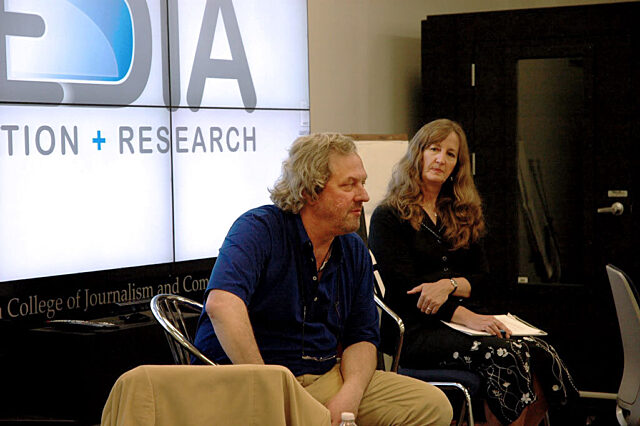Veteran TV journalist Charles Sabine to speak at UF on Huntington’s disease and brain research

Charles Sabine, a veteran Emmy award-winning NBC journalist and spokesman on Huntington's disease (Photo by Maria Farias/University of Florida)
Media representatives are encouraged to call in advance. Valet parking is available at Shands at UF, 1600 SW Archer Road. For more information, call Czerne Reid at 352-273-5814 or email czerne@ufl.edu.
Charles Sabine, a veteran Emmy award-winning NBC journalist, watched his father succumb to Huntington’s disease, a fatal genetic neurological disorder for which there is no treatment or cure. Now he is watching his brother die from the same disease in a gradual process of decline, and Sabine himself faces the same fate.
Since his diagnosis, Sabine has become a patient advocate and spokesman on Huntington’s disease and on freedom of scientific research.
Sabine will speak at the University of Florida at noon Friday, April 8, in a talk titled “A Patient’s Perspective: Why What you are Doing Matters and Why the Future will be a Collaboration.” The event will be held in the DeWeese Auditorium of the McKnight Brain Institute, 100 S. Newell Drive, Gainesville. Sabine’s visit is co-sponsored by Banyan Biomarkers Inc., Center of Innovative Research.
Sabine, who has covered 12 wars and several natural disasters, has gone on location in many countries, including Iraq, Afghanistan, Rwanda, Bosnia, Haiti and Northern Ireland, to cover most of the major international news events of the last quarter of a century. People he met during those experiences have taught him about just how resilient the human spirit is in the face of tragedy, he said.
Charles Sabine, a veteran Emmy award-winning NBC journalist and spokesman on Huntington's disease, spoke with students in the 21st Century Laboratory at the UF College of Journalism and Communications during his visit to UF." Photo credit: UF College of Journalism and Communications
“I learned that humility is the greatest virtue that we can have — none of us is immune from disease or disaster,” he said.
His own life and those of the patients for whom he advocates are now teaching him about the hardiness of the human spirit in the face of mortality. He is on a mission to encourage scientists who are working on potential treatments for brain disorders and to let them know just how much their work means to him and to other patients.
“What they are doing in their labs matters to us more than they will ever know, because in a world of total darkness, the faintest glimmer of light emboldens the human spirit to go on,” Sabine said.
He champions the idea of collaboration among researchers and the patients who stand to benefit from their discoveries. Patients must become involved in clinical trials and other scientific efforts, he said. In so doing, not only do they help advance research efforts, but they also give scientists the kind of personal contact that can be the incentive to go on even when their work seems to hit a dead end.
“It’s what Darwin called the noblest human virtue — that of balance between those who need help and those who can give help,” Sabine said. “That’s what sets us apart as the human race.”